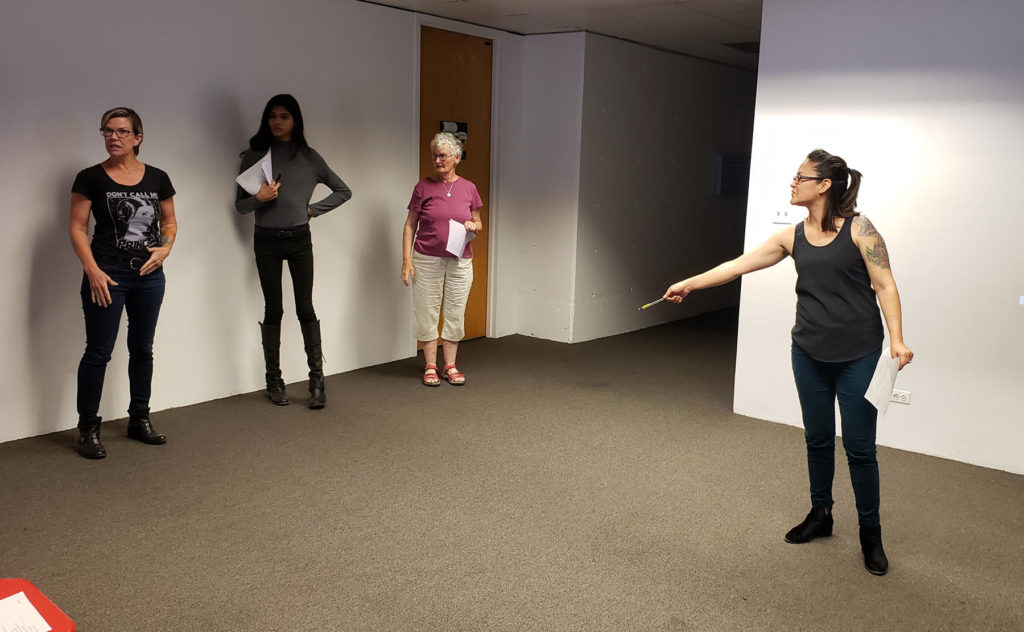
55+ and teen participants rehearse during School of Drag program. Credit: Eli Burke
Case Summary
After intentional efforts to understand the diverse needs, perspectives and experiences of older adults, MOCA Tucson developed creative aging workshop series that pushed boundaries, took risks and combat antiquated and ageist ideas of what older adults want to learn and how they want to express themselves.
Challenge
MOCA Tucson staff were experienced in positioning contemporary art as a springboard for interpretative dialogue that promotes community, they had not built participatory artmaking programs targeting their older adult patrons. Determining which art forms and classes connected to museum’s exhibits and resources might be of interest to older adult learners was initially challenging for Education Director, Eli Burke. Additionally, developing ways to promote MOCA’s new line of creative aging programming offerings also proved difficult (because it was new). Learning the best ways to connect to new audiences was demanding and required dedicated time and effort.
Solution
As a rule, MOCA Tucson is responsive to their students interest and makes community assessment and evaluation key to their programming decisions. Building community is at the heart of all their programs. When the “School of Drag” program aimed at a youth audience launched, older adult patrons expressed interest in participating. Bravely pivoting, MOCA Tucson transformed “School of Drag” into an intergenerational program, welcoming both older and younger participants. Utilizing the museum’s collection to inspire skill development and as a springboard for dialogue, the teaching artist forged bonds among intergenerational class members.
Organizational Profile
Host Organization Name
Museum of Contemporary Art Tucson (MOCA)
Host Organization Description
From MOCA Tucson’s website: Established by artists in 1997, MOCA Tucson is Tucson’s only museum devoted exclusively to contemporary art from around the globe. Housed in a repurposed firehouse in Downtown Tucson, MOCA Tucson applies creative solutions to the problems of today and tomorrow through the vehicle of contemporary art. They create programming that is ambitious, innovative, and that is responsive to the wants and needs of the community. A pioneering museum of its kind in the community, MOCA Tucson currently hosts rotating exhibitions by locally, nationally, and internationally renowned contemporary artists—critical exhibitions that spur dialogue and that foster empathy between artists and audiences. Their bold programming is highly engaging for diverse audiences and creates a welcoming, inviting space for visitors to learn more about the changing world we live in. MOCA Tucson is an important incubator and connector for contemporary art across the Southwest region and beyond.
Host Organization Website
Originally a teen offering, “School of Drag” was converted into an intergenerational program where youth and older adults explored identity, movement and art through gender performance and drag. Participants also learned about creating a character, song/sound elements, costumes, make-up and more. The program was 10 weeks long and was offered to participants for free. This creative aging workshop was coordinated by Eli Burke and was taught by Dante Celeiro.
Learning Objectives
The goals of this series were to build storytelling and performance art skills, and to explore sociopolitical literacy in gender performance.
Facility Details
The workshop classes were held in a large, carpeted performance space at the museum.
Material / Equipment Details
This workshop made use of: costumes, makeup, wigs, as well as a built-in sound system and projector.
Recruitment and Marketing Details
Participants were recruited through local senior centers, LGBTQIA+ organizations, The Southern Arizona AIDS Foundation, the museum’s mailing list and social media, and via the teaching artists’ own networks.
Culminating Event Details
The culminating event, which was very moving to all in attendance, featured live individual and group performances by both workshop participants and local drag performers. Learn more: Innovative “School of Drag” Event Mixes Generations and Gender Performance
About the Initiative
Seeding Vitality Arts in Museums
Aroha Philanthropies’ Seeding Vitality Arts in Museums enables a diverse cohort of museums across America to develop and implement high quality, intensive arts learning opportunities for older adults. The goals of Seeding Vitality Arts are to:
- Demonstrate the power and impact of creative aging programs to a broad national audience
- Encourage arts and cultural organizations to develop participatory arts education programs for older adults
- Encourage organizations that serve older adults to develop arts education programming
- Disseminate effective program models
School of Drag participants, including both high schools students and older adults, rehearse their culminating event performance. Gretchen, a.k.a. "Dapper Daddy," is featured.
Almost all of our elders grew up having to be in the closet, [to] live a lie. This gives them the opportunity to finally be heard, seen, validated and connected.
teaching artist
We compartmentalize our community, and particularly when it comes to age, this begins early on in our lives. We are missing huge opportunities for intergenerational knowledge to be shared in a reciprocal experiential way that provides the space for connection and empathy in ways that traditional educational experiences do not. I would say that things should continue to move in this direction and MOCA Tucson has no intention of slowing that evolution down.
program coordinator
Case Study Details
case study topics
Audience-specific, Equity Diversity Inclusion, Innovative Curriculum, Intergenerational Programing, Recruitmentorganization type
Museumsart form
Drag, Performing Artsprogram site type
Museumspopulation density
Urbanincludes virtual programming?
Nosession details
8-12 sessions @ 90-120 min.
year
2018funding source
Private Foundationfunder
Aroha Philanthropies